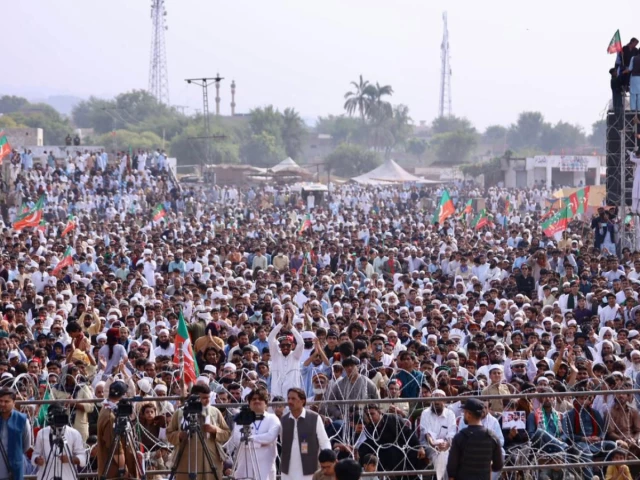‘An operation will not be successful unless the public supports it,’ says Junaid Khan
Sohail Afridi, Chief Minister of Khyber-Pakhtunkhwa, speaking at a Pakistan Tehreek-i-Insaf (PTI) rally in Karak on Sunday, highlighted the pending federal funds for the tribal districts, saying: “For the administration of the tribal areas, we pledged 100 billion from the tribal districts. The federal government owes 550 billion to these areas.”
Afridi also emphasized securing additional federal funds and providing scholarships for local students, while emphasizing that peace and good governance remain the government’s primary focus.
He added that the province’s share was being withheld, saying: “They are withholding our share of 14.6 to 19.4 billion.” Afridi further stated: “The remaining 2.2 billion NFC belongs to the federal government and we will secure it.”
The Prime Minister said the history of the region would change and promised to deliver on development and governance. He highlighted the ongoing projects, including the Peshawar-Dera Ismail Khan Expressway and local pipeline projects, and pledged to equip the police with modern weapons and bullet-proof vehicles.
“Good governance is essential. A package for all four regions of Khyber Pakhtunkhwa will be announced soon,” he added.
PTI leadership addresses rally
PTI provincial president Junaid Akbar Khan and party activist Meena Khan also addressed the rally. Junaid Akbar praised the party leadership and thanked the residents for their support.
He defended the decisions of the party founder, condemned previous violence against civilians, including children on November 26, and promised that the movement would continue peacefully. “Do all the injustice you want: we will be vindicated,” he said.
Read: The Great Jirga rejects the operations and calls for dialogue and peace
He stressed that public support was crucial for any operation to succeed and called for dialogue and reconciliation that would serve Pakistan’s interests. “An operation will not be successful unless the public supports it,” he warned.
The D-Chowk protest on November 26 was part of a nationwide call by PTI founder Imran Khan demanding the restoration of the party’s electoral mandate, the release of jailed party members and the repeal of the 26th Amendment, which he claimed had strengthened a “dictatorial regime”. Supporters from across Pakistan gathered in Islamabad, where the state rejected negotiations and an operation ended the protest.
Meena Khan condemned the violence on November 26 and described the protest for the founder’s release as peaceful. He called for the elimination of corruption and stressed that the system must change before the founder can be released. “Now Sohail Afridi has the opportunity to change this system. We will breathe easy once the founder is released.”
The protests reflect the PTI’s continued mobilization in Khyber-Pakhtunkhwa in the face of ongoing security operations and ongoing debates over governance and accountability in the province.
Read more: Gunmen kidnap 18 workers in Khuzdar
The Great Jirga calls for dialogue in tribal districts
The Karak rally followed the Aman Jirga (peace assembly) held in Peshawar on Saturday. The jirga brought together elders from Bajaur, Khyber and Waziristan, along with PTI workers and community leaders carrying white flags with the message ‘Only Peace’.
The meeting echoed a unified call for stability through consultations and urged the federal government to respect the will of the people of the merged districts.
Tribal elders and PTI members in the National Assembly opposed any new military operations in the tribal districts and instead advocated for dialogue, justice and development to ensure lasting peace.
Afridi urged the federal government to trust both the provincial government and tribal representatives before making decisions on the merged districts, warning: “This time, we will not be scapegoats.”
Speaking at the jirga, tribal elder Malik Khan Marjan said terrorism can only be defeated through dialogue and not military action. “All tribes support the prime minister. Decisions regarding tribal areas will be taken by the tribal jirga itself,” he said, adding that the elders were willing to collaborate with the provincial and federal governments, as well as the military, under Afridi’s leadership.
MPA Abdul Ghani said Afridi’s appointment marks a proud moment for the region. “After 77 years, a tribal son has once again donned the chief minister’s turban,” he said, calling it a symbolic return of tribal representation.




